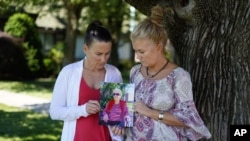When they visit their mother, Barbara and Christine Colucci want to take off their face coverings and give her a kiss. Their 102-year-old mother, who has dementia, lives in a home for retired adults in the state of New York. The two women also want to have more family members in their mother’s room at the same time. But current restrictions prevent that.
“We don’t know how much longer she’s going to be alive,” Christine Colucci said, “so…please, give us this last chance with her in her final months on this earth.”
Pandemic restrictions are easing almost everywhere — except inside many of America’s nursing homes. Rules designed to protect the nation’s most at-risk people from COVID-19 are still being enforced. However, 75 percent of nursing home residents are vaccinated and infections and deaths have decreased sharply.
Families around the country are unhappy with the rules. Hugs and kisses are banned in some nursing homes. Residents are eating meals alone and doing activities at a distance. Visits are limited and must be kept short. And visitors are not welcome if tests show that someone has the coronavirus.
Family members and their supporters question the need for such restrictions when the risk of spreading the virus is low. They say the measures are just worsening older people’s loneliness and increased mental and physical difficulties.
Eighty-year-old Marian Rauenzahn lives in a nursing home in Pennsylvania. She had COVID-19 and then lost part of a leg to an unrelated infection. But her daughter, Denise Gracely, said her biggest struggle is being alone. She was having visits six days a week and now she has none, Gracely said.
Gracely and her sisters can now see their mother once a week. The nursing home said it plans to ease visiting rules for all residents in late June. But that is not enough.
“I believe it’s progressed her dementia,” Gracely said. “She’s very lonely. She wants [to get] out of there so bad.”
Pennsylvania’s long-term care ombudsman has gotten hundreds of complaints about visitation rules this year. Kim Shetler is with the ombudsman’s office. She said some nursing homes’ COVID-19 rules are more restrictive than state and federal requirements. Officials have been doing what they feel is necessary to keep people safe, she said. But families are not pleased.
A recent public opinion study by the group National Consumer Voice for Quality Long-Term Care found that time limits on visits remain common. They go from 15 minutes to two hours. Some places limit visits to weekdays. This can make it difficult for people with daytime jobs.
Rauenzahn’s Pennsylvania nursing home has been limiting most residents to just one, 30-minute visit every two weeks.
On June 11, the Consumer Voice and several other activist groups wrote a letter calling for an end to visiting restrictions at nursing homes. The letter was directed at the Centers for Medicare & Medicaid Services, a part of the U.S. Department of Health and Human Services. The letter said residents continue to suffer from loneliness and mental harm because of limited visits from loved ones.
Activists also disagree with federal guidance on how nursing homes deal with new COVID-19 cases. The guidance says most visits should be suspended for at least 14 days. Some critics say that the suggestion leads to strong restrictions because of one or two cases.
Jason Santiago is the top executive at The Manor at Seneca Hill, a nursing home in the state of New York. He told the Associated Press that being kept alone affected his residents. “We’ve got to do things that make more sense for these residents, make more sense for these families,” he said.
The federal government recently eased restrictions for vaccinated nursing home residents. But New York has not followed that move. People who eat together in common spaces must remain socially distanced, for example. They also must wear face coverings. It does not matter if they are vaccinated. In addition, they must stay two meters apart during activities.
Nancy Kass is a public health expert at Johns Hopkins University in Baltimore, Maryland. Kass said she does not understand the continuing restrictions, which are affecting the residents’ quality of life.
But she noted that the coronavirus has infected more than 650,000 long-term-care residents in America and killed more than 130,000 of them. Nursing homes had to be very careful when COVID-19 was out of control, she added.
I’m Alice Bryant.
The Associated Press reported this story. Alice Bryant adapted it for Learning English. Mario Ritter, Jr. was the editor.
_______________________________________________
Words in This Story
dementia –n. a mental sickness that causes someone to be unable to think clearly or to understand what is real and what is not
nursing home –n. a place where people who are old and unable to take care of themselves can live and be taken care of
resident –n. someone who lives in a particular place
hug –n. the act of putting our arms around someone especially as a way of showing love or friendship
ombudsman –n. a government officials or employee who investigates complaints and tries to deal with problems fairly
complaint –n. a statement that a person is unhappy or not satisfied with something





